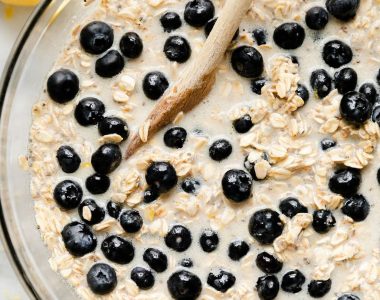
We’re registered dietitians who create recipes anyone can enjoy, and sometimes, we use protein powder in our recipes. We’ve even written about our favorite whey and plant-based protein powders after extensive testing.
This leads to many questions from our readers about whether or not they actually need protein powder — or even if they should be concerned about using it.
Here’s a list of the most common questions our readers send in their emails and comments about the benefits of protein powder (and the potential risks)! If you want to add yours, just drop a comment at the bottom of this post, and we’d love to answer.
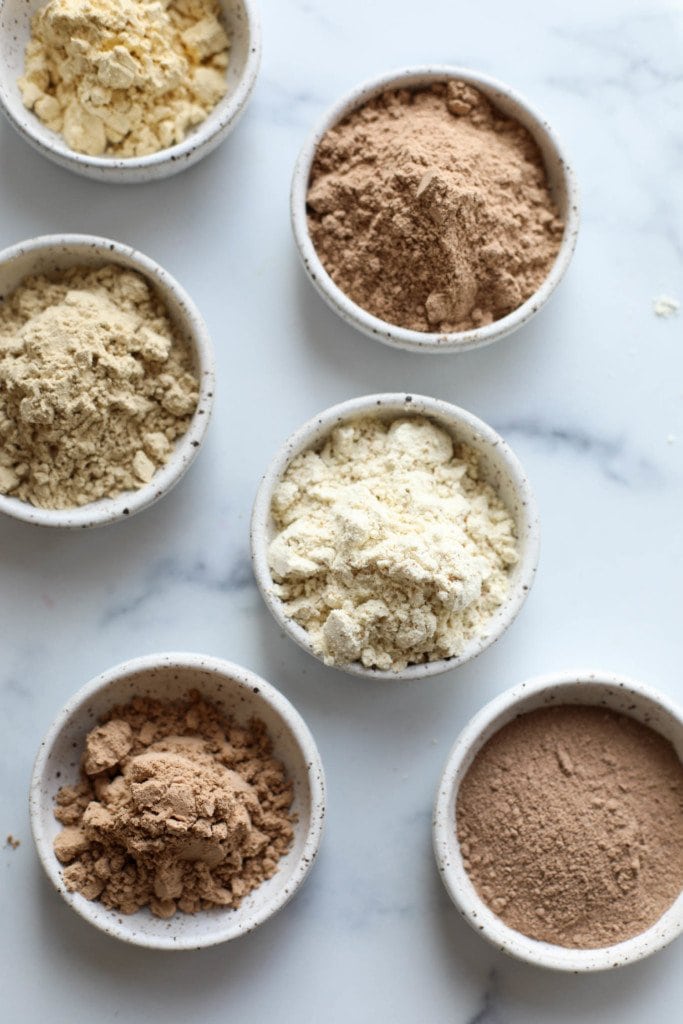
Want to save this page?
Enter your email below & we’ll send it straight to your inbox. Plus you’ll get great new recipes from us every week!
Should I Be Worried About Heavy Metals In My Protein Powder?
With any dietary supplement, quality levels will vary quite a bit — unlike food and drug products, the FDA doesn’t regulate or test them. The protein supplements market is saturated with options, and some of them are going to be not-so-great while others have a clean and effective ingredient profile. And yes, heavy metals have been found in protein powders, although just the presence of some of these compounds isn’t always as concerning as it might sound.
In 2018, the Clean Label Project conducted an independent study of 134 top-selling protein powders (according to Nielsen and Amazon data) from 60 different brands. The tests showed some alarming results. Of the protein powders tested:
- 70% had detectable levels of lead
- 74% had detectable levels of cadmium
- 55% had detectable levels of BPA
- Plant-based protein powders (as a category) had more heavy metals than whey protein powders
- 75% of plant-based protein powders tested positive for lead
- One protein powder tested had 25x the allowed regulatory limit of BPA in just one serving
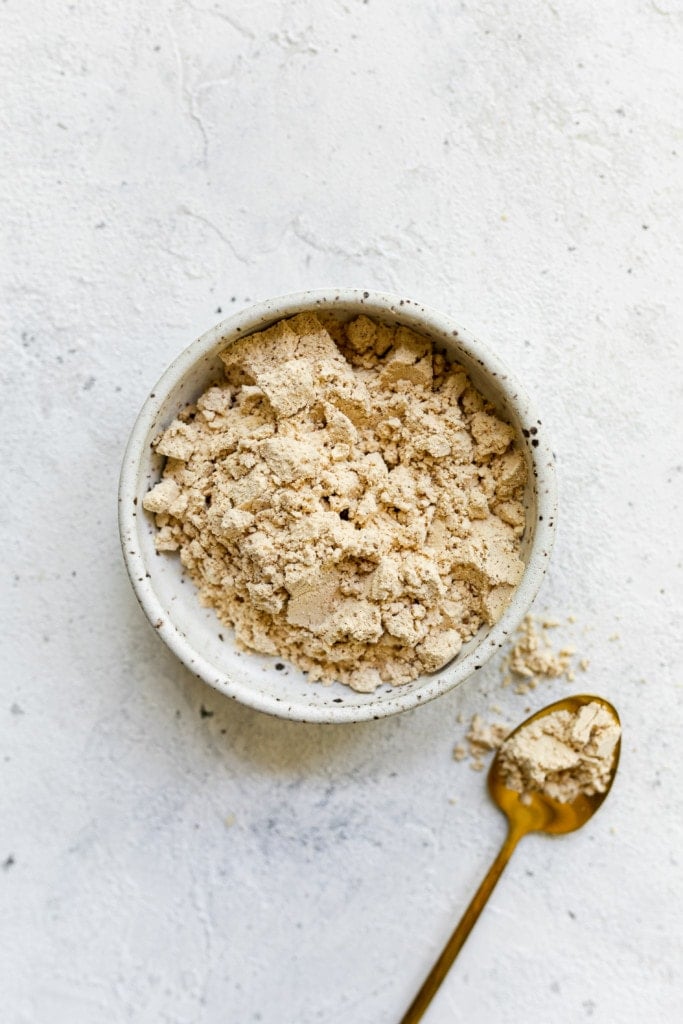
Those are scary stats, but let’s put these results into perspective a little bit.
Heavy metals are naturally occurring substances in the earth’s crust and soil. So, many things that grow in the soil contain detectable levels of heavy metals like cadmium, lead, arsenic, and mercury. That’s why it makes sense that the plant-based protein powders in this study contained more heavy metals than the animal-based protein powders.
Your body has heavy metals in it, and humans even need certain levels of iron, cobalt, copper, manganese, molybdenum, and zinc for the synthesis of key enzymes and for oxidation reduction.
This particular study has been criticized because the data doesn’t differentiate between detectable levels of heavy metals and acceptable levels. Simply having detectable levels does not create a human health risk. But consistently getting moderate to high levels of them does impose a risk of toxicity, which is why it’s best to aim for a protein powder that has acceptable levels of heavy metals, if any at all.
Always check for third-party testing. The best thing to do with protein powders (and any supplement) is to use all the data that’s available to you. The results of the Clean Label Project protein powder review are one source that we rely on. We also look to make sure that any protein powders we use or recommend are third-party tested for contaminants by organizations like NSF International, ConsumerLab, Informed Sport, and U.S. Pharmacopeia.
Brands that conduct third-party testing are typically proud of that fact, so a quick search on their product packaging and/or website can usually tell you if they are third-party certified and by whom.
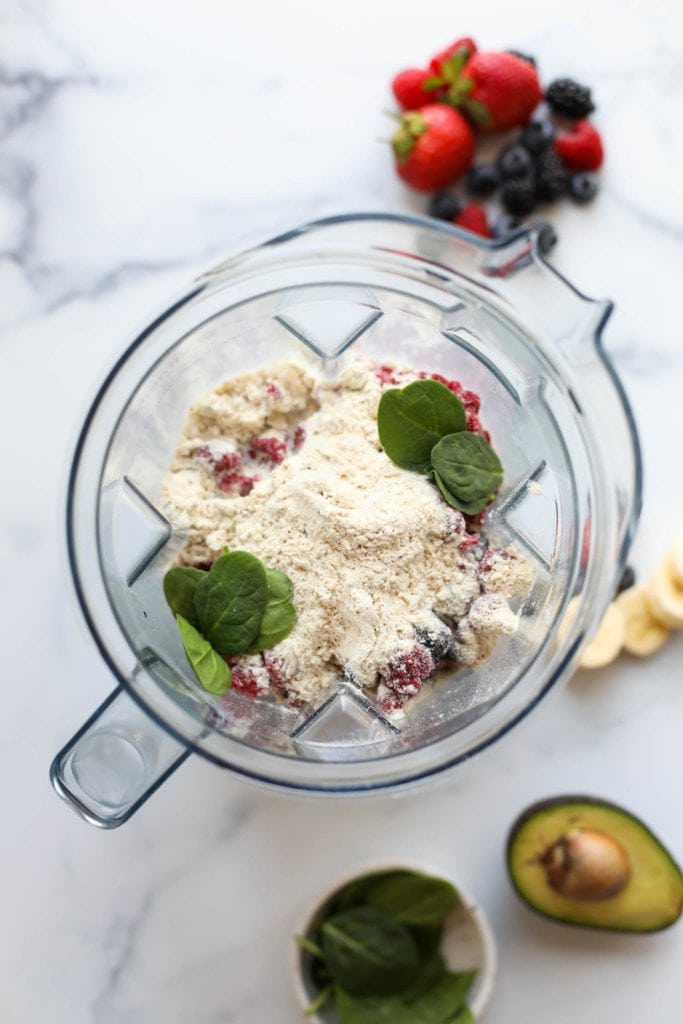
Will It Help Me Lose Weight?
Using protein powder isn’t a direct line to weight loss. You can lose weight regardless of how much protein you consume. What protein powder (or protein in general) can potentially do is help you maintain muscle mass while dropping body weight. It’s not uncommon to lose muscle while losing weight if you’re not getting enough protein.
Adding protein powder to your drinks and foods, without making any other alterations to your diet, will not necessarily result in weight loss. In fact, it could cause weight gain by adding more calories (and maybe even more added sugars, depending on the brand) to an otherwise unchanged intake of nutrients.
However, boosting protein in smoothies and other recipes while also increasing fiber intake can help you feel more full from meals and result in smaller portions, fewer food cravings, and less mindless snacking over the day. If that’s the case, and you’re also eating fewer added sugars throughout the day while increasing protein intake, then protein powder can help you maintain muscle mass (aka “not lose muscle”) as you pursue a weight loss plan.
Will It Help Me Build Muscle?
Yes, consuming protein is essential to the muscle-building process, so getting extra daily protein via powders can help. Whether you are trying to maintain muscle while losing weight or bulk up and build muscle, you’ll want to aim for an amount of protein that accounts for 30-35% of your daily calories.
For someone following a 2,000 calorie diet, that would look like consuming 600-700 calories from protein, or 150 to 175 grams of protein. Since that is a lot of protein to get in a single day, adding 1-3 scoops of protein powder to your day, spaced out among meals, snacks, and/or fluids is one strategy to help you get that much protein.

Do I Actually Need This?
Certainly not everyone needs or should use protein powder. However, it can be a much more convenient option for increasing your total protein intake compared to adding a large amount of protein-rich foods.
The reason many people do use a protein powder is because they find that they’re not getting close to their recommended protein intake for their age, gender, and activity level. Or, maybe they just don’t eat high-protein foods very often.
Whey protein powder provides between 20-25 grams of protein per single scoop, so it can be a simple and effective way to increase protein quickly. Simply stirring a scoop into a cup of coffee, oatmeal, or yogurt is a pretty big protein payoff for little effort.
You can also get a similar amount by eating 3 ounces of cooked chicken, beef, turkey, seafood, or pork, or 1 cup of cottage cheese, for example.
Some people who could benefit from a higher protein intake, whether that’s from a protein powder or other sources, are:
- older adults experiencing muscle loss, which is a natural progression that starts for most people in their 30s and speeds up significantly around ages 50-60 (known as sarcopenia)
- people recovering from an illness or infection, severe burns, or surgery
- physically active people and athletes who have increased wear and tear on muscles
- people trying to lose weight without losing muscle
- people trying to gain muscle mass
- someone with a malabsorption or inflammatory issue, such as Crohn’s disease, celiac disease, cystic fibrosis, and some cancers
- someone who is pregnant (especially in the 2nd and 3rd trimester) or breastfeeding
- vegetarians and vegans who aren’t intentional about getting protein every day or who don’t get them from a variety of plant-based sources
Is It Safe To Use Protein Powder Every Day?
Yes, it is safe for most healthy adults to consume protein powder daily. And a consistent intake of protein powder could even provide some research-backed benefits such as maintaining a healthy weight, lowered blood pressure, improved satiety and fewer hunger cravings, and building muscle.
What it’s not safe to do is to use excessive amounts of protein powder every day, which could lead to kidney damage. In addition to getting protein from foods, a safe and healthy intake of protein powder is 1-3 servings daily.
What Will Happen If I Get Too Much Protein?
It is possible to get too much protein. If you do, you’d be putting excess strain on your kidneys, causing intestinal discomfort and diarrhea, and you could also experience headaches, fatigue, irritability, and/or weight gain.
But getting too much protein is pretty rare, since you’d be having to eat a ton of protein-rich foods or take 10+ scoops of protein powder daily (factoring in no other dietary protein) to get to dangerously high levels.
The tolerable upper limit (the highest you could safely go) for healthy adults is 3.5 grams of protein for every kg of weight (or 1.6 grams of protein for every pound you weigh). For example, a person who weighs 160 lbs should not exceed 256 grams of protein in a day (160 x 1.6 = 256).
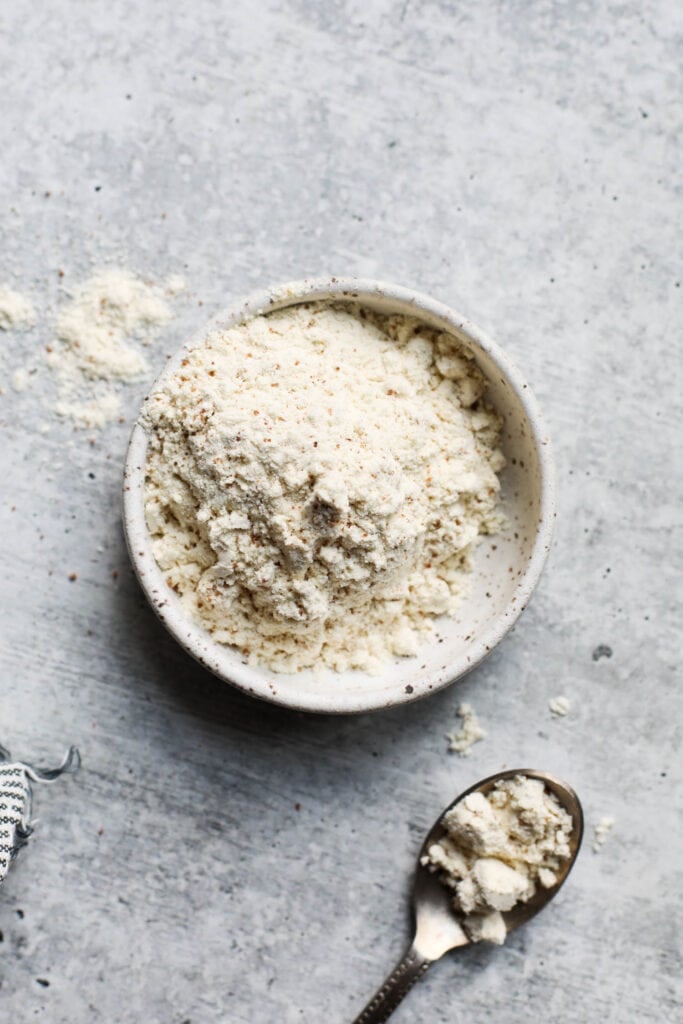
What Ingredients Should I Look For? Which Ones Should I Avoid?
Some ingredients that indicate a higher quality type of protein powder are:
- whole-food protein sources, such as grass-fed whey, peas, brown rice, quinoa, hemp seeds, pumpkin seeds, chia seeds, or even watermelon seeds
- if using a whey protein for building muscle, look for one with 3 specific BCAAs (branched chain amino acids): leucine, isoleucine, and valine
- zero sweeteners OR natural sweeteners in low amounts, such as coconut sugar, organic cane sugar, stevia, monk fruit, Reb-M (fermented sugarcane), or erythritol
- some protein powders also contain omega-3s, which can be beneficial for minimizing post-exercise soreness
- blends that include digestive enzymes (such as lactase, protease, amylase, and lipase) can be beneficial if you experience bloating, cramps, or gas pain after using protein powder
Some ingredients to avoid in protein powders are:
- artificial colors, sweeteners, and flavors (they don’t cause harm in small amounts, but it’s best to avoid them in products you use every day)
- fillers like maltodextrin, cornstarch, or cellulose (they increase volume without providing nutrition)
- high sugar levels (this can range from 0 to 20+ grams per scoop)
- dietary allergens that you may want to avoid, such as nuts, eggs, dairy, gluten, or soy
Should I Use Whey Protein Or A Plant-Based Option?
Whey protein powder provides more protein (typically 20-25 grams per scoop) than plant-based powders (typically 15-20 grams per scoop) and it’s more efficient for your body to digest. Also, as a category, whey- and casein-based powders contain fewer heavy metals than plant-based powders.
There are some studies that show plant-based protein powders are not as effective at building muscle as animal-based protein powders are, but other studies show little difference. Technically, plant-based options like pea protein aren’t “complete proteins,” meaning they don’t contain all 9 essential amino acids, but this isn’t necessary in your protein powder if you’re hitting your protein needs with food, too.
If you are vegan, 100% dairy free, or highly sensitive to lactose, a plant-based protein powder is the best option. Other than that, it really comes down to personal preference.
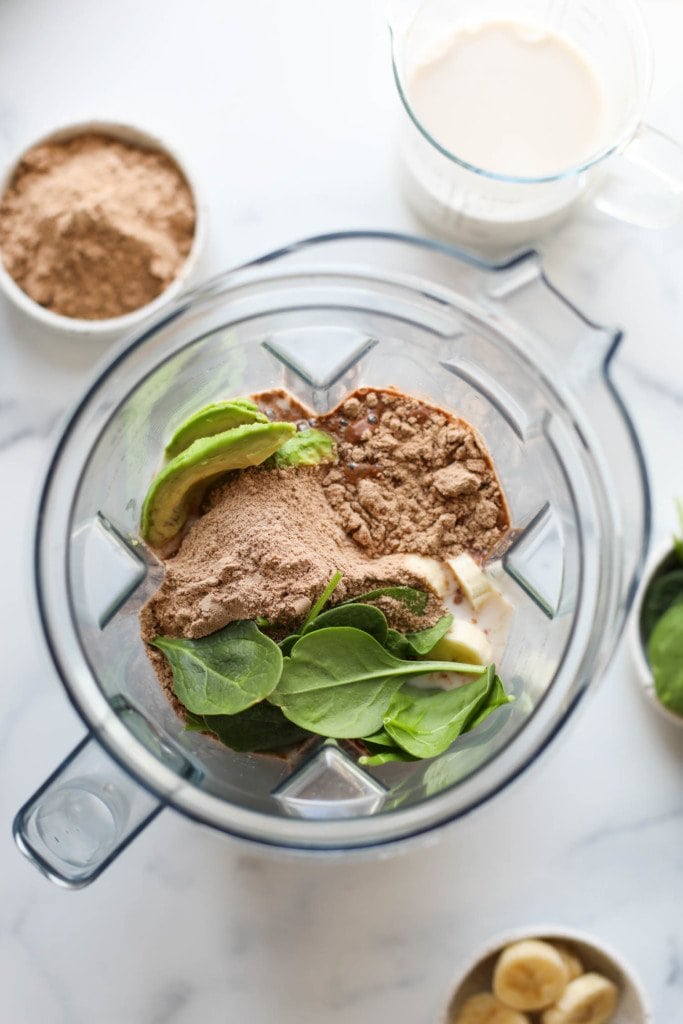
Will Soy Protein Powder Disrupt My Hormones?
Short answer: No.
There are rumors out there that the phytoestrogens in soy protein can increase breast cancer risk, cause thyroid hormone imbalances, contribute to infertility, and even cause men to grow “man boobs.” But those rumors have been debunked by science, with a meta analysis of clinical studies showing that there’s no hormonal effect in men or women.
A plus for soy-based protein powders is that they’re the only single-ingredient plant-based protein that provides all nine essential amino acids. One study even showed that it created muscle growth matching that of whey protein.
A downside for soy-based protein powders (and why they don’t appear in our list of top plant-based options) is because nearly all of them are based on soy protein isolate. It’s a heavily processed ingredient that uses chemicals to strip soybeans down into a protein-rich white powder while removing all the beneficial fiber and minerals. This process can also leave behind unwanted residues, such as hexane, aluminum, and nitrites.
Why Is There Cholesterol In Whey Protein Powder?
Any animal-based product contains some amount of cholesterol. And since whey protein is made from the milk of cows, it contains some cholesterol, too, just like steak, milk, eggs, cheese, and chicken. Whey protein contains about 100 milligrams of cholesterol per serving on average.
Contrary to popular belief, eating foods that contain dietary cholesterol does not have a direct effect on blood cholesterol. In fact, research shows there’s no correlation between dietary cholesterol intake and the development of cardiovascular disease. Instead, the biggest impact on blood lipid levels (like total cholesterol, HDL cholesterol, and LDL cholesterol), are the mix of carbohydrates and fats in your diet.
Since protein powder is not typically a high-carb or high-fat product, its impact on blood cholesterol levels is generally not a concern.
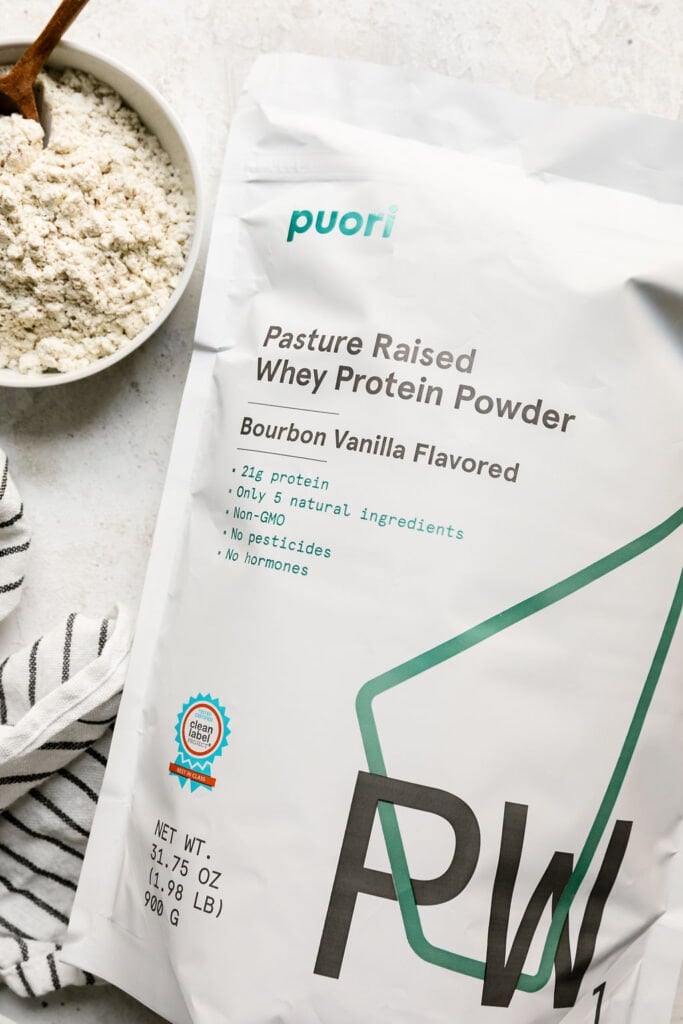
Which Protein Powder Should I Use?
Since we get asked about protein powders so often, we created our list of favorite whey protein powders and plant-based protein powders. Check those posts out for even more details on the ones we recommend.
Over several months, we reviewed ingredient labels at length, checked for quality standards and third-party testing, tested them for solubility in liquids and in baked goods, tasted them to make sure it’s a pleasant experience, and avoided powders that had things we didn’t want, like artificial sweeteners, fillers, and sketchy marketing claims. We also update our lists annually as we sample new protein powders.
Here are a few of our go-to protein powders:
For ultimate success, we highly recommend reading the tips in the full blog post above. All photos and content are copyright protected. Please do not use our photos without prior written permission. If you wish to republish a recipe, please rewrite the recipe in your own unique words. Link back to the source recipe here on The Real Food Dietitians. Thank you!


